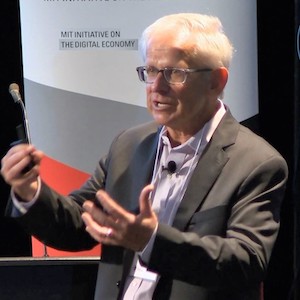 How about this: in Harvard Business Review, two leaders at Johns Hopkins suggested that hospitals could learn something about buying equipment from -- drum roll, please -- the airline industry. You don't often find many people defending airlines these days, much less holding them up as good examples of anything (except, perhaps, about what not to do, what with overbooking, cramped leg space, plenty of add-on fees, and, of course, dragging paying passengers off planes). That their recommendations make sense probably says more, though, about how poorly health care often does things than how well airlines do...
How about this: in Harvard Business Review, two leaders at Johns Hopkins suggested that hospitals could learn something about buying equipment from -- drum roll, please -- the airline industry. You don't often find many people defending airlines these days, much less holding them up as good examples of anything (except, perhaps, about what not to do, what with overbooking, cramped leg space, plenty of add-on fees, and, of course, dragging paying passengers off planes). That their recommendations make sense probably says more, though, about how poorly health care often does things than how well airlines do...
Harvard Business Review
See the following -
Good Ideas From Unexpected Places: Thinking Creatively for Healthcare Innovation
- Login to post comments
Halamka's 2016 Predictions for Health IT
 As the year ends and we archive the accomplishments and challenges of 2015, it’s time to think about the year ahead. Will innovative products and services be social, mobile, analytics, and cloud (SMAC)? Will wearables take off? Will clinicians be replaced by Watson? Here are my predictions...Apps will layer on top of transactional systems empowered by FHIR...a better approach is crowdsourcing among clinicians that will result in value-added apps that connect to underlying EHRs via the protocols suggested in the Argonaut Project (FHIR/OAuth/REST). One of our clinicians has already authored a vendor neutral DICOM viewer for images, a patient controlled telehealth app for connecting home devices, and a secure clinical photography upload that bypasses the iPhone camera roll. That’s the future.
As the year ends and we archive the accomplishments and challenges of 2015, it’s time to think about the year ahead. Will innovative products and services be social, mobile, analytics, and cloud (SMAC)? Will wearables take off? Will clinicians be replaced by Watson? Here are my predictions...Apps will layer on top of transactional systems empowered by FHIR...a better approach is crowdsourcing among clinicians that will result in value-added apps that connect to underlying EHRs via the protocols suggested in the Argonaut Project (FHIR/OAuth/REST). One of our clinicians has already authored a vendor neutral DICOM viewer for images, a patient controlled telehealth app for connecting home devices, and a secure clinical photography upload that bypasses the iPhone camera roll. That’s the future.
- Login to post comments
Is Environmental, Social, And Governance (ESG) Activity the New ESP?
 Harvard Business Review published (January/February 2021) an article How to Talk to Your CFO About Sustainability written by Tensie Whelan and Elyse Douglas, both associated with the NYU Stern Center for Sustainable Business. This excellent article opens assuming a universal commitment by corporations to some level of environmental, social, and governance (ESG) activity. It further suggests a universal impression most Chief Financial Officers (CFOs) view such commitments as "a cost rather than a source of value." This impression resonated with me as a resilience and risk practitioner.
Harvard Business Review published (January/February 2021) an article How to Talk to Your CFO About Sustainability written by Tensie Whelan and Elyse Douglas, both associated with the NYU Stern Center for Sustainable Business. This excellent article opens assuming a universal commitment by corporations to some level of environmental, social, and governance (ESG) activity. It further suggests a universal impression most Chief Financial Officers (CFOs) view such commitments as "a cost rather than a source of value." This impression resonated with me as a resilience and risk practitioner.
- Login to post comments
Millennials Are (Not) So Different
 Millennials get a bad rap. If we believe conventional wisdom about them, they like to live with their parents, at least until they can move into their urban-center condo. They hate to drive. They're maddening in the workplace, demanding lots of frills and constant praise yet returning little loyalty. They're hyperconnected through their various digital devices. And, when they deign to think about health care, which isn't often, they want all digital, all the time. There's some truth to the conventional wisdom, but not as much as you'd think. A new study from Credit Karma flatly asserts that "everything you thought you knew about Millennials may be wrong," finding that they still have aspirations to much of the same "American Dream" as previous generations...
Millennials get a bad rap. If we believe conventional wisdom about them, they like to live with their parents, at least until they can move into their urban-center condo. They hate to drive. They're maddening in the workplace, demanding lots of frills and constant praise yet returning little loyalty. They're hyperconnected through their various digital devices. And, when they deign to think about health care, which isn't often, they want all digital, all the time. There's some truth to the conventional wisdom, but not as much as you'd think. A new study from Credit Karma flatly asserts that "everything you thought you knew about Millennials may be wrong," finding that they still have aspirations to much of the same "American Dream" as previous generations...
- Login to post comments
The New Rules of Healthcare Platforms (Part 4): APIs Enable the Platforming of Healthcare
 Recent regulations have mandated the use of HL7 FHIR APIs (application programming interfaces) to share health data. The regs apply to healthcare providers, payers, and technology developers who participate in federal programs. Many incumbent healthcare organizations are viewing these mandates as a compliance burden. That’s short-sighted. We recommend a more opportunistic POV. APIs facilitate the sharing of health data across different devices and platforms. By adopting APIs, healthcare organizations can transform themselves from traditional service providers into powerful platforms that can connect patients, providers, and other stakeholders in new and innovative ways.
Recent regulations have mandated the use of HL7 FHIR APIs (application programming interfaces) to share health data. The regs apply to healthcare providers, payers, and technology developers who participate in federal programs. Many incumbent healthcare organizations are viewing these mandates as a compliance burden. That’s short-sighted. We recommend a more opportunistic POV. APIs facilitate the sharing of health data across different devices and platforms. By adopting APIs, healthcare organizations can transform themselves from traditional service providers into powerful platforms that can connect patients, providers, and other stakeholders in new and innovative ways.
- Login to post comments
The Wrong Legacies of Health Information Technology
 I read two articles this week that got me thinking, Robert Charette's "Inside the Hidden World of Legacy IT Systems" (IEEE Spectrum) and Douglas Holt's "Cultural Innovation" (Harvard Business Review). Both deal with what I'll call legacy thinking. It's a particular problem for healthcare...If you are in healthcare and rely on legacy systems, you're in trouble. If you are in healthcare and are not acutely aware of what your Achilles heel is, someone else is going to exploit it. Even if you are a new healthcare entrant with more modern technologies but still based on the current ideology, your impact is going to be limited.
I read two articles this week that got me thinking, Robert Charette's "Inside the Hidden World of Legacy IT Systems" (IEEE Spectrum) and Douglas Holt's "Cultural Innovation" (Harvard Business Review). Both deal with what I'll call legacy thinking. It's a particular problem for healthcare...If you are in healthcare and rely on legacy systems, you're in trouble. If you are in healthcare and are not acutely aware of what your Achilles heel is, someone else is going to exploit it. Even if you are a new healthcare entrant with more modern technologies but still based on the current ideology, your impact is going to be limited.
- Login to post comments
Three Ways To Improve U.S. Healthcare, As Demonstrated In India
Listening to caregivers from other countries, it's easy to feel exasperated about U.S healthcare. American hospitals are filled with good people trying to do good work, but at every turn the system of misplaced incentives gets in the way of good patient care...
- Login to post comments